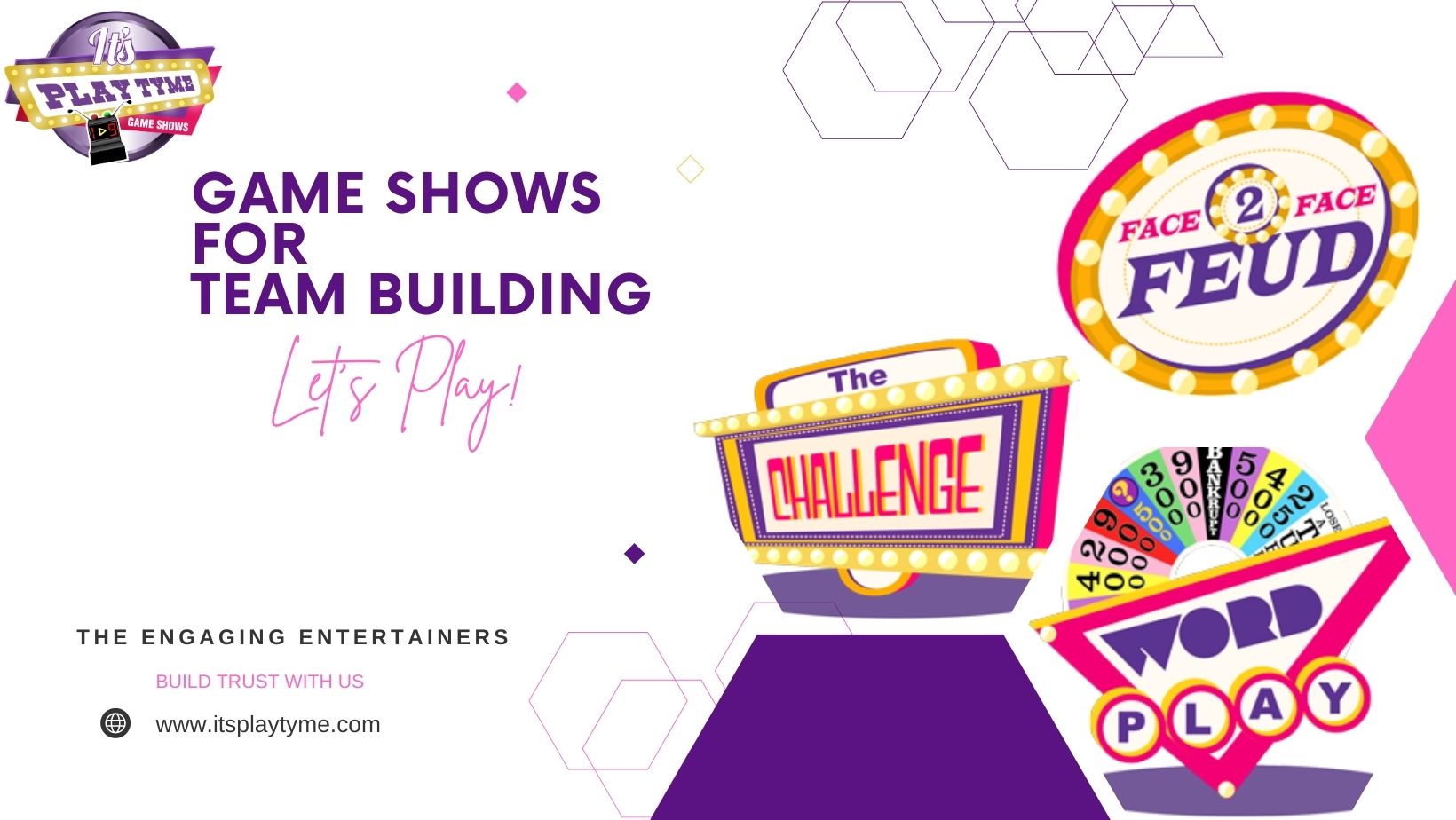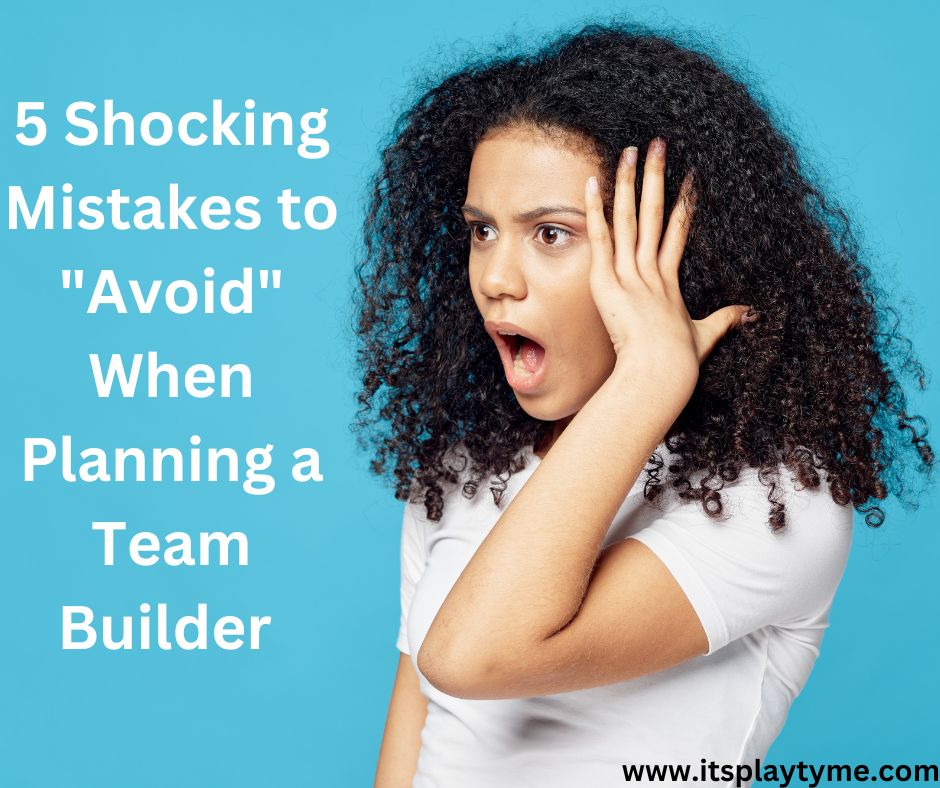NJ Team Leaders, are you ready to take your team to new heights with an epic team-building event?
Picture this: you’ve spent countless hours and endless efforts to organize a team-building event that’s meant to be the pinnacle of camaraderie and productivity.
However, beneath the surface, there are hidden landmines waiting to explode your plans. But fear not!
We’ve delved deep into the world of team-building events and discovered five shocking mistakes that can turn your event from extraordinary to disastrous.
Stay with us as we unravel these mistakes and learn from the pros to ensure your event is a resounding success.
You Won’t Believe these Shocking Mistakes Made When Planning a Team Building Event

1. The #1 Blunder That Can Doom Your Team-Building Event
Your heart is set on a fantastic team-building experience, but beware of the number one blunder that can wreck it all.
The first mistake is the biggest blunder that can doom your team-building event from the start.
It all begins with unclear objectives. You might be thinking, “Isn’t team building all about having fun and fostering team spirit?
While that’s true, having specific, well-defined objectives is the cornerstone of a successful team-building event.
Learn from the masters and discover how to set crystal-clear objectives that steer your event in the right direction.
Team members may not understand the purpose behind the activities, leading to disengagement and a lack of enthusiasm.
When objectives are vague, participants may feel that the event is merely a formality without any real impact on their teamwork or personal development.
To avoid this mistake, take the time to identify the key goals you want to achieve through the team-building event.
Are you looking to improve communication, boost team morale, enhance problem-solving skills, or build trust among team members?
Once you’ve defined your objectives, tailor the activities and structure of the event to align with these goals.
This will give your team a clear sense of purpose and a shared vision, making the event more meaningful and impactful.
2. Team Building Catastrophe: The Big Ignore!
Imagine this scenario: your team members arrive at the event, brimming with anticipation, only to realize that their needs and preferences are entirely disregarded.
It’s a team-building catastrophe waiting to happen.
This mistake occurs when organizers overlook the power of catering to individual desires and creating an event that resonates with everyone.
Dig deeper into the psychology of understanding your team members’ needs and preferences to craft a tailor-made experience that leaves them thrilled.
You’ll uncover the key to creating a truly engaging and enjoyable team-building event. Each team member is unique, with different interests, personalities, and comfort zones.
If you take the time to gather insights from your team through surveys or informal discussions, you can gain valuable information about the types of activities they enjoy and the goals they wish to accomplish.
Armed with this knowledge, you can design a diverse range of activities that cater to various interests and personalities.
This inclusive approach ensures that every team member feels valued and included in the event, leading to higher levels of participation and enthusiasm.
Remember, when individuals feel that their preferences are considered, they are more likely to engage fully in the team-building experience.
3. The Hidden Landmines: Team Size and Dynamics
Ah, the mysterious world of team size and dynamics.
It’s not just about counting heads and hoping for the best. There’s an art to understanding the unique blend of personalities, roles, and relationships within your team.
The success of your team-building event hinges on finding the perfect balance in team size and understanding the dynamics at play.
A small team may thrive in intimate settings, where trust and collaboration can flourish, while a larger group may thrive in more dynamic and competitive environments.
Additionally, consider the different roles and personalities within your team. Are there natural leaders who can take charge during activities?
Are there introverts who may need encouragement to participate actively? By recognizing and embracing these nuances, you can choose activities that promote collaboration, communication, and cohesion among team members.
Incorporating activities that cater to the strengths and preferences of each team member will not only maximize engagement but also create a supportive and inclusive atmosphere.
When team members feel comfortable expressing their ideas and opinions, they are more likely to contribute fully to the success of the event.
4. The Planning Nightmare You Can’t Wake Up From
Let’s talk about the planning nightmare that can haunt your dreams, shall we?
No one wants their event to go south. The devil is in the details, and without meticulous planning and flawless logistics, your team-building event can quickly turn into a horror show.
Stay one step ahead by mastering the art of detailed planning and flawless logistics.
From selecting the perfect venue to coordinating transportation, catering, and activity arrangements, every aspect requires careful consideration.
Start by creating a detailed timeline and checklist to ensure that nothing falls through the cracks. Assign responsibilities to a capable team of organizers who can handle various aspects of the event.
Communicate regularly and effectively to ensure everyone is on the same page and aware of their roles.
Consider the flow of the event and the transition between activities. Are there any potential bottlenecks or logistical challenges that need to be addressed in advance?
By preemptively identifying and resolving these issues, you can ensure a smooth and seamless experience for your team.
Don’t forget to test any technology or equipment required for the activities, and have contingency plans in place for unforeseen circumstances.
By dotting your I’s and crossing your T’s, you can rest assured that your team-building event will be a well-executed and memorable affair.
5. The Big Mistake Most People Forget to Fix
The grand finale is here as the curtain falls, and we’ve saved the best for last.
Once the event is over, most people forget to take stock of what went down. Don’t be one of them! What comes next?
The biggest mistake many organizers make is failing to assess the results and gather valuable feedback.
This mistake robs you of the opportunity to understand the true impact of your team-building event and improve future endeavors.
We’ll show you how to assess the results and gather feedback that will leave you stunned.
It’s important to understand the world of post-event analysis and uncover learning from the past to shape a brighter future for your team.
The event’s conclusion is just the beginning of the learning process. Take the time to collect feedback from participants, either through surveys or interactive feedback sessions.
Ask them about their overall experience, the activities they enjoyed the most, and the key takeaways they gained from the event.
Review the feedback with your organizing team and identify strengths and areas for improvement.
Celebrate the successes and acknowledge any challenges faced during the event. Use this valuable information to refine your approach and create an even more impactful team-building event in the future.
Remember that continuous improvement is essential for long-term success. Use the insights gained from the post-event analysis to iterate and enhance your team-building events, ensuring that each new endeavor surpasses the last.
FAQs: Unmasking the Truth About Team-Building Events

Q1: How long should a team-building event last?
The truth is, it varies, there is no one size fits all answer. The ideal length depends on several factors, including the objectives of the event, the nature of the activities, and the preferences of the participants.
Half-day or full-day team-building events are common choices. These durations allow enough time for engaging activities and meaningful interactions without overwhelming participants.
However, some companies opt for multi-day retreats, especially for more extensive team-building experiences that delve deeper into team development and bonding.
When deciding on the duration, consider the availability of your team members and any work-related commitments they may have.
A team-building event that disrupts work schedules too much might lead to decreased productivity and cause additional stress.
Strike a balance that allows for meaningful participation without imposing excessive time constraints on your team.
Q2: Can team-building events be conducted virtually?
Of course, Virtual team-building events have become increasingly popular, especially in the age of remote work setups and global collaborations.
There are a vast array of innovative tools and platforms that can recreate the excitement and engagement of in-person events.
Video conferencing platforms offer opportunities for interactive games, virtual escape rooms, and collaborative challenges that can bring your team together, regardless of geographical barriers.
Keep in mind that virtual team-building requires thoughtful planning to ensure everyone can actively participate.
Consider time zones and internet connectivity, and choose activities that are easily accessible to all team members.
By leveraging technology creatively, you can create engaging and impactful virtual team-building experiences that encourages team cohesion and strengthen remote relationships.
Q3: What if some team members are reluctant to participate in team-building activities?
It’s natural for some team members to be hesitant about team-building activities, especially if they’ve had negative past experiences or feel uncomfortable in social settings.
The key to overcoming reluctance lies in offering a diverse range of activities that cater to different interests and personalities.
Create an inclusive environment where team members can choose activities that resonate with them.
Encourage team members to express their preferences and provide options that appeal to introverts, extroverts, and everyone in between.
By respecting individual preferences and ensuring a non-threatening atmosphere, you can ease apprehensions and encourage active participation.
Consider incorporating ice-breaker activities at the beginning of the event to help team members get to know each other and feel more at ease.
As the event progresses, you’ll likely see hesitant team members gradually open up and engage with enthusiasm.
Q4: Should team-building events be mandatory for all employees?
The truth might surprise you! “Mandatory” attendance may not be the best approach.
While making team-building events mandatory might seem like a straightforward way to ensure participation, it may not always yield the desired results.
True engagement and enthusiasm cannot be forced. Instead of mandating attendance, focus on creating team-building events that are genuinely exciting and rewarding.
By offering fun activities that align with individual interests and team objectives, team members will be more motivated to participate willingly.
When team members see the value and impact of team-building events on their personal and professional growth, they will naturally embrace the opportunity to participate in the future.
Remember, team-building is about creating more positive relationships and a collaborative work environment. This can only be achieved when team members are genuinely interested and engaged.
Q5: How can team-building events benefit the overall organization?
Team-building events have far-reaching benefits that extend beyond the immediate experience.
A successful event can lead to improved communication among team members, enhanced problem-solving skills, increased trust and camaraderie, and heightened motivation to achieve shared goals.
Team members who feel connected and valued are more likely to collaborate effectively, leading to increased productivity and creativity within the organization.
Also, these bonding events provide opportunities for members to develop essential soft skills, such as leadership, communication, and adaptability, which are invaluable assets in today’s dynamic work environment.
A positive team culture nurtured through team-building events can result in reduced employee turnover and higher job satisfaction, ultimately contributing to a more cohesive and successful organization.

Final Key Takeaways
Now that you’ve dived deeper into the shocking mistakes to avoid when planning a team-building event in NJ, you are armed with extensive insights and expert advice,and ready to take your team to greater heights.
Embrace the wisdom gained from understanding the blunders of vague objectives, ignoring individual needs, team size and dynamics, and planning nightmares, as well as the importance of post-event analysis.
By applying this knowledge, you can create a team-building experience that fosters genuine connections, boosts team morale, and enhances productivity, leaving everyone in awe of the positive transformation.
It’s time to lead your team towards success and camaraderie with an unforgettable event!
Planning a Team Builder?
Team Leaders! Book a live game show experience today!
Contact us for further details.
We come to your office, venue or off-site location..
For Immediate assistance by text – 917-670-4689
No deposit required. 5-star rated on google.





